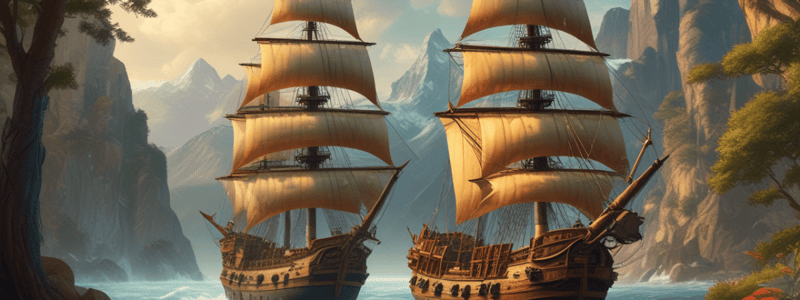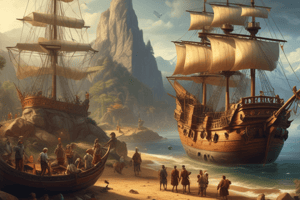Podcast
Questions and Answers
What marked the beginning of the Age of Discovery for Europe?
What marked the beginning of the Age of Discovery for Europe?
- Exploration prior to the Medieval Age
- Vibrant merchant roots
- Increased technological advancement (correct)
- Islam's presence in Southeast Asia
Which empire in West Africa surpassed the Mali Empire in size, strength, and wealth by 1500?
Which empire in West Africa surpassed the Mali Empire in size, strength, and wealth by 1500?
- Askia the Great Empire
- Mali Empire
- Songhai Empire (correct)
- Ghana Empire
What played a vital role in guiding European explorers during their voyages in the Age of Discovery?
What played a vital role in guiding European explorers during their voyages in the Age of Discovery?
- Tang dynasty inventions
- Mayan inventions
- Compass and astrolabe (correct)
- Viking navigational tools
Which city was known for being a major trading port with a significant Islamic presence in Southeast Asia?
Which city was known for being a major trading port with a significant Islamic presence in Southeast Asia?
What facilitated European exploration during the Age of Discovery by being crucial for long-distance voyages?
What facilitated European exploration during the Age of Discovery by being crucial for long-distance voyages?
Who became the first European to round the southern tip of Africa (Cape of Good Hope)?
Who became the first European to round the southern tip of Africa (Cape of Good Hope)?
Which explorer successfully reached India by sea in 1498, opening up the spice trade for Portugal?
Which explorer successfully reached India by sea in 1498, opening up the spice trade for Portugal?
Who accurately identified the newly discovered lands as a separate continent, leading to its naming as America?
Who accurately identified the newly discovered lands as a separate continent, leading to its naming as America?
Which explorer initiated an era of piracy by raiding Spanish ships and towns in 1577-1580?
Which explorer initiated an era of piracy by raiding Spanish ships and towns in 1577-1580?
The Golden Age of Piracy featured which prominent figure known for his exploits and activities during naval conflicts?
The Golden Age of Piracy featured which prominent figure known for his exploits and activities during naval conflicts?
Flashcards are hidden until you start studying
Study Notes
- After the Medieval Age, the world saw increased technological advancement and interaction, with the 1450s marking the beginning of the Age of Discovery for Europe.
- Prior to European exploration, there were already vibrant merchant roots connecting various regions like the Indian Ocean, where the spice trade had been ongoing for centuries.
- By the late 1300s, Islam had a presence in Southeast Asia, particularly in the port city of Malacca, where Parameshwara founded the Malacca Sultanate, the region's first major Muslim state.
- In West Africa, Islam spread through traders and merchants, leading to the conversion of empires like Ghana and Mali, eventually culminating in the Songhai Empire under Askia the Great.
- The Songhai Empire, known for its centralized rule and adoption of Islam, became a dominant power in West Africa by 1500, surpassing the Mali Empire in size, strength, and wealth.
- European exploration during the Age of Discovery was facilitated by advanced ships like caravels, carricks, and galleons, which were crucial for long-distance voyages, trade, and colonization.
- Navigation tools such as the compass and astrolabe, borrowed from Chinese and Arab inventions, played a vital role in guiding European explorers during their voyages.
- The Portuguese, under Prince Henry the Navigator in the 15th century, were among the first major explorers of this era, driven by motives of expanding Christendom, seeking glory, and accessing gold through exploration and trade.- After establishing a school for Navigators, the Portuguese focused on the trans-Saharan trade to access sources of gold, bypassing Islamic influence in Western Africa.
- Portuguese exploration led to the discovery of various coastal regions such as the Gold Coast (Ghana), Grain Coast, Ivory Coast, and Slave Coast.
- Bartolomeu Dias became the first European to round the southern tip of Africa (Cape of Good Hope) in 1487, paving the way for further exploration.
- Vasco de Gama successfully reached India by sea in 1498, opening up the spice trade for Portugal and breaking the Ottoman control over it.
- Pedro Alvarez Cabral accidentally discovered eastern South America in 1500, leading to the establishment of Brazil by the Portuguese.
- The Portuguese established dominance in Southeast Asia by capturing Malacca in 1511, gaining control over the lucrative spice trade.
- The Spanish, led by Christopher Columbus in 1492, landed in the Caribbean instead of Asia, leading to the colonization and exploitation of the Americas.
- Amerigo Vespucci correctly identified the newly discovered lands as a separate continent, leading to its naming as America.
- Magellan's expedition in 1519 successfully completed the first circumnavigation of the globe, proving the possibility of reaching the East Indies by sailing westward.
- Spanish conquistadors, including Hernan Cortes and Francisco Pizarro, conquered the Aztec and Inca Empires, leading to the exploitation of the native populations in South America.
- Spanish colonization in the Americas led to the establishment of viceroyalties, exploitation of resources like gold and silver, and the introduction of forced labor systems like encomienda.
- The injustices towards the native populations in the Americas were documented by Bartolome De Las Casas, leading to reforms such as the abolition of the encomienda system.
- English exploration in North America began with John Cabot in 1497, following the earlier Viking expeditions, while Portuguese explorers may have reached Eastern Canada in the 1470s.- Labrador, Cabot, and the Corte Real brothers disappeared during expeditions from 1498 to 1502, potentially sharing the same fate in the mid-1500s.
- Francis Drake, an English explorer turned privateer under Queen Elizabeth I, initiated an era of piracy by raiding Spanish ships and towns in 1577-1580.
- Drake completed the first English circumnavigation of the globe in 1580 and helped defeat the Spanish Armada in 1585 during the Anglo-Spanish War.
- In 1607, the English established their first permanent settlement in Jamestown, followed by Plymouth settled by Puritans in 1620.
- The British colonized the northeastern coast, forming new colonies like Connecticut, Maryland, and Rhode Island in the 1600s.
- On the other hand, the Dutch established the New Netherland province with a capital at New Amsterdam (Manhattan) in 1624.
- The Golden Age of Piracy featured phases involving buccaneers, pirate republics, prominent figures like Henry Morgan, and eventual decline due to increased naval efforts and pirate hunters.
Studying That Suits You
Use AI to generate personalized quizzes and flashcards to suit your learning preferences.




